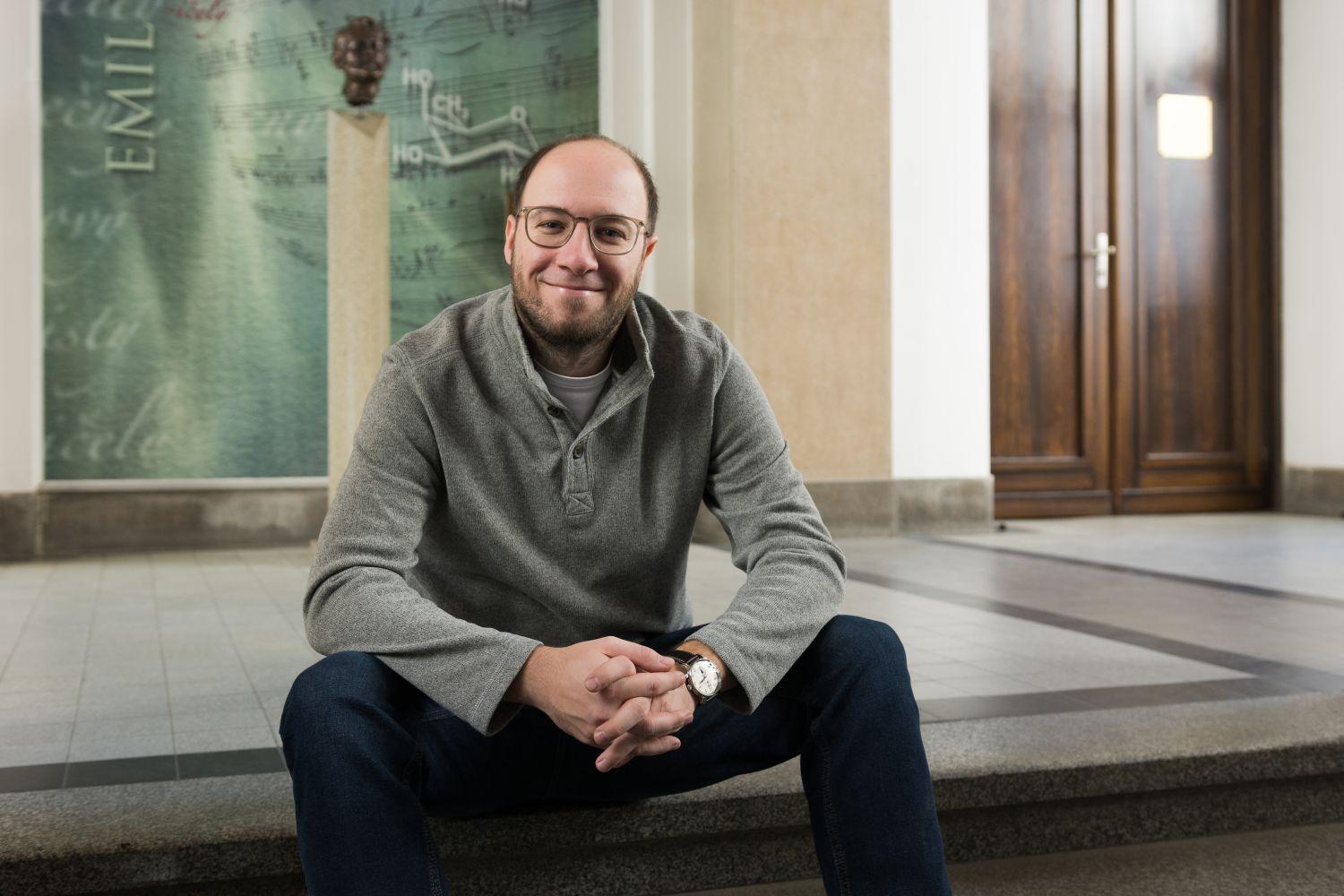
Our new JuniorStar: The biggest challenge? Starting from scratch
Dr. Daniel Bím received a prestigious JuniorStar excellence grant from the Czech Science Foundation (GACR). Competition for JuniorStar grants is fierce, but projects that are funded present early career researchers with a priceless chance to implement their ideas and to work towards research group independence. JuniorStar grantees have five years to implement their ideas and receive financial support up to 25 million CZK. Dr. Bím’s proposal was entitled Optimization of nickel catalysts for improving stability and catalytic efficiency under photochemical and electrochemical reaction conditions. What will the work on the project entail, why did it get funded, and what are Dr. Bím’s plans for the future? Read more below.
Could you introduce your winning JuniorStar research idea to us?
My research will focus on the development of new catalysts for chemical reactions. If I had to put it in perspective, imagine that you are somewhere in a valley and you have a bicycle with you. You can travel in different directions, and depending on your abilities, you are able to climb hills of varying heights. However, if you had an electric bike, you could also climb hills in other directions that you wouldn’t be able to go up with a normal bike and you can get to the hilltops much faster. A catalyst in chemical reactions works just like the motor of an electric bike.
My goal is to understand how exactly these catalysts work so that we can modify them and then figure out how and where to use such catalysts for targeted reactivity.
In my JuniorStar project, I will deal with catalysts based on nickel complexes and the energy (the “engine” of the reaction) will come from either light or electrical potential. At the same time, I try to take into account the sustainability of the entire project.
Who is conducting this research with you?
At the moment, I am the only member of my group. However, the group will grow in 2025. I have only been back at UCT Prague since August and, thanks to this grant, I will be able to put my team together.
So, are you recruiting new members?
Yes, I would be happy for students and other applicants to contact me. I believe that—thanks to my interdisciplinary orientation—successful candidates can gain experience in various fields applicable to either a further research career or one in the commercial sector.
The JuniorStar grant category is very competitive. What made yours stand out? What strengths did the evaluation committee highlight?
I haven’t seen the committee’s evaluation yet.
And it is really difficult to evaluate a proposal in the context of other projects. All the proposals submitted are good, so I think luck also plays a role. Perhaps my interdisciplinary outlook caught the committee’s attention. In my proposal, if there is a risk that something might not work, I suggest many ways of overcoming the problem. Often, in my research, a setback leads me to discover something completely new and interesting. Techniques that I use in my research include, for example, organic and inorganic synthesis, spectroscopy, photochemistry, electrochemistry, and quantum chemical calculations.
Why nickel catalysts? What makes nickel advantageous compared to other metals?
Nickel catalysts could replace more toxic, heavy, and expensive metals such as palladium or platinum. In recent years, researchers have shown that nickel catalysts can catalyse a number of interesting reactions important in industrial production (e.g. various cross-coupling reactions). They also might have the potential in reactions where existing catalysts are not good enough.
25 million CZK is a significant funding level. How do you plan to use these funds?
It is certainly a very generous grant and I am very grateful that the Czech Science Foundation has made such a substantial investment in supporting early career researchers. However, although the amount might seem high, one must realize that building and equipping a laboratory from scratch and hiring a completely new team is very expensive. I will not be freed from dealing with finances for five years, but I will definitely submit proposals for additional funding (for example, within the framework of my collaborations).
What practical applications might your research have?
I am engaged in basic research. So, first of all, I try to understand how these chemical systems work. My goal is to look at the investigated catalysts in great detail. Once we gain a very deep insight, it will become possible to use the catalysts on a more applied basis in the future. For example, right now, most nickel complexes cannot be used under normal conditions such as in air. However, if we better understand the principles regarding the reactivity of nickel complexes with oxygen, we can try to prevent them from reacting, thus opening the door to wider real-world applications.
Perhaps rather than replacing existing platinum and palladium catalysts (used in a very wide range of reactions in the commercial sector in the production of pharmaceuticals, cosmetics, petrochemicals, and so on), we may discover new directions in which the catalysts used to date cannot be used.
What do you think the biggest challenges to achieving your project goals are?
Probably the fact that we are starting from nothing. This means building a new, fully functional laboratory. Given that this is a relatively “hot” research topic, the laboratory will gradually need to be developed to be competitive on the world stage. On the other hand, the advantage of chemistry is that—even with basic equipment—you can do quality research and discover something interesting in any endeavor.
What are you most looking forward to with JuniorStar?
Working with the students. I myself have always learned something important from all my mentors. I hope that I will now be able to pass on my experience and knowledge.
You started with investigating the synthesis and production of pharmaceuticals at UCT Prague, and then moved on to modelling chemical properties in catalysis and theoretical chemistry during your postdoctoral work in the US. What drove this transformation?
In science, one should never stand still. One should always have a certain goal in mind. What shaped me the most were those moments when I came across something I didn’t know how to do. I wanted to learn more and move forward in exploration.
How did your international experience influence you and what “lessons learned” could benefit UCT Prague?
To be honest, research abroad didn’t seem fundamentally different to me, and I don’t find comparisons to be appropriate. Every place and every research group I’ve worked in has enriched me in some way. It’s not about where you go, but rather how open-minded you are. We also do have top scientists and great research institutions.
On the other hand, Caltech (California Institute of Technology), for example, had the advantage of being one of the best research institutions in the world, and yet it has a very low student-to-faculty ratio (it’s about half that of UCT Prague). Still, over 40 Nobel laureates are associated with Caltech. That’s why there were always plenty of opportunities to talk about science with top researchers., But this is due to Caltech’s prestige, not the country it’s located in. There are certainly also aspects that are handled worse there than here.
Are you only interested in theoretical chemistry these days, or do you still occasionally engage in experimental chemistry?
I definitely engage in experimental chemistry as well. I started at UCT Prague’s Department of Organic Chemistry and gained experience in organic synthesis. Then I took a detour to computational, quantum chemistry, through research at the Institute of Chemistry and Biochemistry of the Czech Academy of Science (IOCB CAS) and the J. Heyrovský Institute of Physical Chemistry. My first postdoctoral position was in computational chemistry at the University of California, Los Angeles (UCLA). Then I received a Marie Skłodowska-Curie fellowship which got me into Caltech. There I focused mainly on experimental chemistry again. The JuniorStar project will be experimental in nature but still be intertwined with aspects of theoretical chemistry.
Until recently, you also did work at IOCB CAS. Did you leave the Tomáš Slanina Group?
This collaboration was part of the so-called “return phase” of the Marie Skłodowska-Curie Global Fellowship, where you receive support for two years outside Europe and then a year back in the Czech Republic (or other European country of origin). With Tomáš Slanina, I continued the research I was doing in the US. So, I was more of an outside observer in his group. Even so, I had the opportunity to learn a lot from him and from the other members of the group. Tomáš and I continue to collaborate and are working on several joint projects.
A number of awards preceded your recent success. Which of these do you value most?
That’s difficult, every award is valuable in some way, and I appreciate them all. But I personally consider the most prestigious to be the Česká Hlava – Doctorandus in Natural Sciences award. I received it just after moving to the US, so I hadn’t even really unpacked, and I was on my way back to the Czech Republic for the award ceremony. Otherwise, I see each of these awards as a kind of reminder that I’m on the right path and that I should continue. In science, you are often up for a while and then down again. Every award like this encourages you to keep going.
How did you prepare for JuniorStar and what would you recommend to others?
I had the advantage that I had enough time for writing the proposal thanks to the one-year return phase of the Marie Skłodowska-Curie Global Fellowship. This allowed me to prepare for everything, write slowly, and think the project through.
What would I recommend? Consult with more experienced colleagues and take rather a seriously critical look at your proposal before submitting it. Most importantly, believe in what you do and don’t be afraid to submit proposals to calls. The fact that I received several awards does not mean that I am in any way exceptional. I was a bit lucky too, but above all, I’ve never hesitated to put my hat in the ring.







